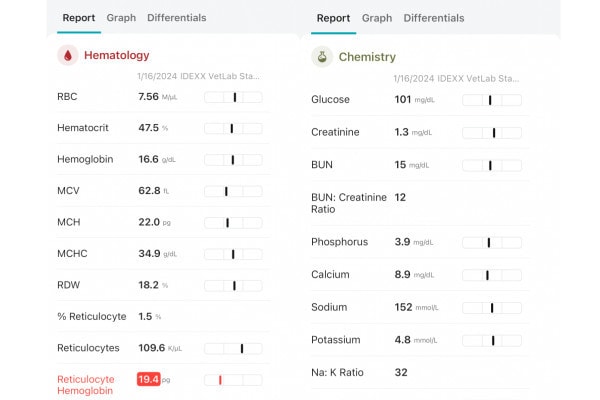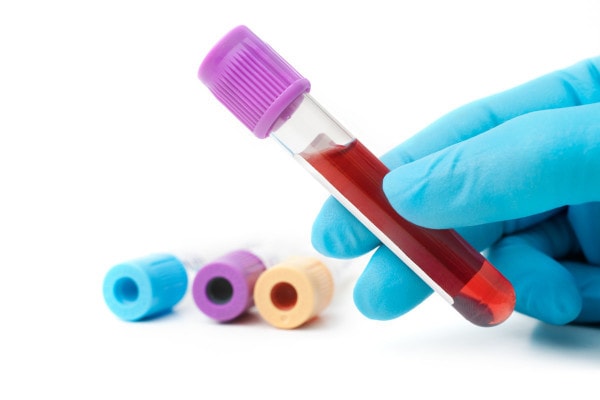When your vet starts talking about blood tests for dogs, it can be easy to get overwhelmed by all the different acronyms and tests. To help you sort through the alphabet soup that can go along with blood work, integrative veterinarian Dr. Julie Buzby created this easy-to-use guide to blood tests. Plus, she offers some tips to help you understand your dog’s blood tests.

Whether I’m seeing a senior dog for a wellness exam or because of a potential problem, blood tests for dogs are something that I frequently discuss with my clients.
Understandably, sometimes when I mention blood tests, I can see a worried look cross the face of the dog parent. And then they may start asking questions like “Why does my dog need a blood test?”, “What will blood work tell us?”, “Does my dog need blood work even if he or she looks healthy?”, or “What kind of blood tests are there?”
These are all very valid questions. And I completely understand why a dog parent would want to know this information. That’s why I created this guide to dog blood work.
If you’re looking for information on a specific test, you can use the table of contents to jump to that test. Otherwise, let’s dive right in—starting with why vets run blood tests in the first place.
Why do dogs need blood tests?
Veterinarians may recommend blood tests for dogs for a variety of reasons.
Blood work screens for problems and establishes a baseline
Routine wellness blood work can be great for any dog, but especially for senior dogs. As dogs enter their golden years, they are at higher risk for many conditions, especially organ dysfunction. By performing regular screening blood work, your veterinarian can detect some conditions sooner. This is important because the earlier the vet finds and addresses a problem, the better the outcome often is.
Additionally, wellness blood work provides a starting point for interpreting blood work in the future. For example, knowing that a dog has had elevated liver enzymes for years is helpful. That way, if the dog comes in feeling sick but the liver enzymes aren’t significantly different than in the past, the vet knows to look elsewhere for the problem. Or, on the flip side, if the liver values were normal in the past and now elevated, the vet knows the liver could be the source of the problem.

Blood tests assess a dog before anesthesia or surgery
The veterinarian will also recommend blood work for dogs before a surgery or procedure. These blood tests help ensure the dog has sufficient red blood cells to carry oxygen, white blood cells to fight infection, and platelets for clotting. Plus, blood tests can check the liver and kidneys to ensure that they are healthy enough to break down and excrete the anesthetic drugs or other medications.
If you are wondering “Is my dog too old for anesthesia?” or “Is my dog too old for surgery?”, a thorough physical exam and blood work can often go far in answering those questions.
Blood tests monitor dogs on chronic medications
Blood tests are also useful for monitoring dogs who are on long-term medications. For example, some prescriptions like NSAIDs (e.g. carprofen for dogs) can impact kidney or liver function when used long-term. So, dogs who are routinely taking these medications need more frequent blood tests for monitoring.
Or, as another example, dogs who are on trilostane for dogs to treat Cushing’s disease will need periodic blood work. This helps ensure that the medication is keeping their Cushing’s disease under control.
Blood tests diagnose or monitor diseases
Finally, veterinarians may perform blood work to detect certain diseases or monitor the progression of those diseases. Blood work can be used for diagnosis of:
- Hypothyroidism
- Liver disease
- Cushing’s disease
- Hyperparathyroidism
- Kidney disease
- Bleeding disorders
- Diabetes mellitus
- Contagious diseases (e.g. parvovirus or leptospirosis)
- Tick-borne diseases
- Heartworm disease
- Addison’s disease
- And many other conditions
What are the different types of dog blood tests?
As you have learned, blood tests have many uses. So unsurprisingly, there are also a multitude of different potential blood tests. CBCs and blood chemistries are the the two most common blood tests for dogs. This combination of tests is referred to as a “minimum database.” It has that name because it is a great starting point for many situations.

Vets often use CBC and chemistry blood panel tests for dogs:
- Before surgery to assist in evaluating the safety of anesthesia for that patient and in making an anesthetic plan
- For routine monitoring and screening for diseases (especially in senior dogs)
- To diagnose why a dog is sick (such as dogs with diarrhea or vomiting)
- To rule in/out some causes of seizures in dogs
- To monitor patients with specific diseases like kidney or liver failure or diabetes
- Before starting a new medication or while taking a medication long-term (e.g. NSAIDs or phenobarbital)
Note: The information below is intended to be informational, not diagnostic. Keep in mind that the article includes some of the more common causes of blood test abnormalities, not every possible cause. The results of blood tests must be interpreted in light of the clinical picture (e.g. exam findings, symptoms, etc.). If you have specific questions or concerns about your dog’s blood test results, please contact your veterinarian.
Complete blood count (CBC)
A complete blood (CBC) for dogs is one of the most common blood tests your veterinarian might recommend. As the name indicates, vets primarily use a CBC to measure white blood cell count, red blood cell count, and platelets.
White blood cells
White blood cells are part of the immune system. The are made in the bone marrow and help fight off infections.
Increases or decreases in the overall number of white blood cells can indicate your dog is sick, stressed, or fighting off an infection. And the white blood cell count can sometimes give an idea of how well the bone marrow is functioning.
Plus, it is helpful that the CBC results list the number of each type of white blood cells (e.g. lymphocytes, neutrophils, monocytes, eosinophils, basophils). Knowing which specific cells are increased or decreased can provide clues about what is going on in the dog’s body.
Red blood cells
Red blood cells (RBCs) are the most numerous blood cells in your dog’s body. They work continuously to carry oxygen from your dog’s lungs to the rest of the body using a pigment called hemoglobin.
A CBC measures both the amount of red blood cells and the amount of hemoglobin (HGB) in your dog’s body. If either of these numbers is low, it can indicate anemia in dogs. There are many causes of anemia in dogs, including immune-mediated hemolytic anemia (IMHA in dogs).
On the other hand, if RBCs or HGB are mildly increased, it could indicate that your dog is dehydrated or has one of several underlying medical problems. More profound increases in RBC number may point to a rare condition called polycythemia vera (i.e. increased production of red blood cells by the bone marrow.)
A CBC also evaluates the size and hemoglobin concentration of red blood cells. This is important because, in combination with other findings, changes in the size, shape, or appearance of red blood cells can help the vet reach a diagnosis.

Platelets
Additionally, a CBC measures platelets. Platelets (PLT) are responsible for helping blood clot after your dog gets a cut or other injury. If the total platelet count is low (i.e. thrombocytopenia in dogs), it can indicate that your dog has a blood clotting problem like immune-mediated thrombocytopenia (ITP in dogs).
Alternatively, high platelets numbers may point to a number of problems (e.g. inflammatory conditions or cancer, etc.).
Chemistry panel
The other most common blood test, a chemistry panels for dogs, has many components that provide information about a range of body systems. This makes it a great way assess your dog’s overall health. Usually there is a number at the end of the name—such as CHEM 17 or CHEM 15. This number indicates how many different values the chemistry panel is measuring.
Each of the different components of the chemistry panel can help your veterinarian learn something about your dog. Let’s take a closer look at them.
Electrolytes
The chemistry panel assesses multiple different electrolyte levels.
- Na—Sodium is an electrolyte that plays an essential role in regulating the movement of fluids. Vets often look at sodium and chloride together when interpreting electrolytes.
- If sodium is elevated (i.e. hypernatremia) mildly, this might be due to dehydration or the dog overheating. But, if the sodium is severely elevated, this can be life-threatening for your dog. Significantly hypernatremia can cause excess fluid to move to the brain, which may lead to brain hemorrhage, coma, or death.
- Hyponatremia (i.e. low sodium) is often due to decreased water intake, recent kidney damage, or gastrointestinal (GI) problems.
- Cl—Chloride is an electrolyte that also helps regulate fluid movement and acid-base balance.
- If chloride is elevated (i.e. hyperchloremia), it might indicate that your dog has persistent diarrhea or that your dog has kidney problems.
- If chloride is low (i.e. hypochloremia), this may be due to vomiting or dehydration.
- K—Potassium is an electrolyte that helps your dog’s brain, muscles, and heart function.
- Hypokalemia (i.e. low potassium) is often associated with kidney disease or severe stomach upset. If the potassium is very low, it can be very dangerous for dogs—causing weakness, drunken appearance and collapse.
- Hyperkalemia (i.e. high potassium) is usually due to dehydration or abnormal function of the urinary system such as an obstructed urethra.
A combination of electrolyte imbalances can also point the vet toward specific conditions. For example, high blood potassium and low blood sodium often (but not always) occur with Addison’s disease.
Protein—Albumin (ALB) and Globulin (GLOB)
The blood chemistry test assesses two main proteins in the blood—albumin and globulin. Total protein (TP) is the measurement of the combination of these two proteins. But they also can be measured separately.
- Albumin (ALB)—Elevated albumin can reflect dehydration. Decreased albumin is associated with abnormal kidney, liver, or digestive function.
- Globulin (GLOB)—Elevated globulin levels may suggest an an inflammatory condition, certain infections, or cancer (e.g. multiple myeloma or B-cell lymphoma in dogs).
Minerals—calcium (Ca) and phosphorus (P)
A blood chemistry panel also measures the levels of two minerals—calcium and phosphorous. These minerals strengthen the teeth and bones and help with energy production and cell signaling (among other things). The body tightly controls the levels of calcium and phosphorus using parathyroid hormone and calcitriol (Vitamin D).
- Calcium (Ca)
- Elevated calcium (i.e. hypercalcemia in dogs) may occur due to cancer, bone breakdown, kidney disease, hyperparathyroidism (i.e. increased secretion of parathyroid hormone), vitamin D toxicity in dogs, and other conditions.
- Low calcium (i.e. hypocalcemia) might indicate pancreatitis, kidney or liver failure, antifreeze poisoning, or, in lactating dogs, milk fever. Severe hypocalcemia is serious and may result in seizures or death.
- Phosphorus (P)
- Increased phosphorus is most commonly seen with kidney failure, but may also occur in vitamin D toxicity, urethral obstruction, or problems with the parathyroid.
- Decreased phosphorus occurs in diabetic ketoacidosis (DKA in dogs) and problems with the parathyroid, kidneys, or GI tract.

Cholesterol (CHOL)
Cholesterol in dogs is very similar to cholesterol in humans. The liver creates cholesterol by metabolizing fat.
- High levels of cholesterol can indicate hypothyroidism, Cushing’s disease, or protein-losing nephropathy (i.e. a kidney disease).
- Low cholesterol occasionally occurs in liver disease or if the dog is not eating.
Glucose (GLU)
Blood glucose is a measure of a dog’s blood sugar. Elevated levels may indicate diabetes mellitus (i.e. diabetes in dogs). Low blood sugar (i.e. hypoglycemia) can occur in newborn puppies, dogs with an insulin-secreting tumor or sepsis, or in diabetic dogs who get too much insulin.
After diagnosing a dog with diabetes and starting him or her on insulin, the vet may also obtain a series of blood glucose readings over 8-12 hours (or longer if the dog is wearing a continuous glucose monitor). This gives the vet a good idea of how well the insulin is controlling the dog’s blood sugar at different points in the day.
Alternatively, some veterinarians might recommend diabetic dogs have a fructosamine blood test to confirm the diagnosis or monitor the efficacy of insulin therapy. This test gives an average of the blood sugar over the past two to three weeks.
Liver enzymes (ALT, AST, ALP, GGT)
When evaluating the liver, the vet will start by looking at four liver enzymes—ALT, AST, ALP, GGT. When a dog suffers liver damage, the alanine aminotransferase (ALT) and aspartate aminotransferase (AST) levels may rise. And elevations in the gamma-glutamyltransferase (GGT) or alkaline phosphatase (ALP or ALKP) point to an issue with the flow of bile through the liver.
To learn more, check out my articles on high liver enzymes in dogs, high ALP in dogs, and liver disease in dogs.
Bilirubin (TBILI)
Bilirubin is a breakdown product of hemoglobin (i.e. the pigment in red blood cells). It is primarily handled by the liver. If total bilirubin is elevated, it may suggest that there is increased destruction of red blood cells (leading to anemia), liver dysfunction, or decreased flow of bile through the liver.
Blood urea nitrogen (BUN) and creatinine (CREAT)
The two main markers of kidney function on the chemistry panel are the blood urea nitrogen (BUN) and creatinine (CREAT). The vet will usually interpret one value in light of the other. Elevated BUN and CREAT typically indicate kidney failure in dogs.
To further evaluate the kidneys, the vet may also run a urinalysis to look for changes in urine concentration and other markers of kidney disfunction. And he or she may suggest a symmetric dimethylarginine (SDMA) test. This blood test is very specific to kidney function and can detect kidney failure sooner than the BUN and creatinine.
Additionally, after diagnosing a dog with kidney failure, the vet can use the SDMA and CREAT levels to determine the stage of kidney disease in dogs. And he or she will most likely periodically recheck the BUN, creatinine, and SDMA to monitor the progression of kidney disease.
However, not every dog with an elevated BUN or CREAT has kidney disease. High BUN may also be associated with dehydration, GI bleeding, and heart disease. And low BUN could be a result of over hydration from IV fluids or liver failure.
Similarly, high creatinine is also occasionally seen in dehydration. It is worth noting too that loss of muscle mass (such as may occur in an older animal) can lead to a lower creatinine. This may cause kidney disease to look less severe on blood work than it really is.

Pancreatic enzymes
Blood chemistry panels typically measure two pancreatic enzymes— amylase (AMYL) and lipase (LIPA). Amylase and lipase can become elevated if pancreatic inflammation (like pancreatitis in dogs) is present. However, they are very non-specific. And they can also be elevated in kidney disease, intestinal disease, and if your dog is taking certain medications.
Therefore, if your veterinarian suspects that your dog might have pancreatitis, exocrine pancreatic insufficiency (EPI), or pancreatic cancer, he or she might recommend additional tests that are more specific to the pancreas. Usually this is a pancreatic lipase immunoreactivity (PLI) or trypsin-like immunoreactivity (TLI) blood test.
Creatinine kinase (CK)
The enzyme creatinine kinase (CK) is primarily found in muscle cells, and may leak out as a result of muscle damage. Therefore, elevations in CK usually indicate muscle inflammation, trauma or injury, or increased muscle activity. Since ALT and AST (two enzymes normally associated with liver disease) are also found in the muscles in small amounts, dogs with muscle damage may have an increased ALT and AST as well as an increased CK.
Additional tests
As you have learned, a CBC and chemistry panel can give you and your veterinarian many pieces of information about your dog’s health. However, there are sometimes situations where your vet may recommend additional tests. This may be the case if:
- The vet recommends screening your dog for a condition like heartworms as part of a wellness exam.
- The CBC and blood work point to a condition, but reaching an official diagnosis requires a confirmatory test.
- Your dog is on a long-term medication that requires specific monitoring (e.g. phenobarbital levels for dogs with seizures).
- The disease the vet suspects doesn’t usually show up on a CBC or chemistry
- The vet wants to gather more information about your dog’s condition or how best to manage it
Some potential blood tests your vet might run include:
Thyroid panel
The vet can use a thyroid blood test for dogs to confirm a diagnosis of hypothyroidism in dogs (which is common in dogs) or hyperthyroidism (which is rare in dogs). T4 (thyroxine) is a thyroid hormone vets commonly measure to get a general idea of thyroid function. But in some situations it can be helpful to do a thyroid panel, which contains additional tests such as T3, TSH, free T4, etc.
GI panel
The vet may add a GI blood test for dogs to a chemistry panel to help determine why a dog has digestive upset (e.g. vomiting and diarrhea). A GI panel often includes the specific pancreatic tests (PLI and TLI) plus measures cobalamin and folate.
Heartworm blood test
Even if a dog is on year-round heartworm prevention, many vets will recommend a yearly blood test for heartworms. This is especially important in areas where heartworm disease in dogs occurs frequently.
Additionally, if a dog hasn’t been on heartworm prevention in the past, or has had a lapse in prevention, the vet may recommend a heartworm test before starting (or re-starting) a heartworm preventive. This helps ensure the dog does not already have heartworms (and therefore need heartworm treatment, not heartworm prevention).

In some areas of the country, the vet may run the IDEXX® SNAP® 4Dx® Plus Test. This combination test screens for four conditions—heartworm disease, plus exposure the agents that cause three tick-borne diseases in dogs (Lyme disease, Anaplasmosis, and Ehrlichiosis).
Tests for Cushing’s disease and Addison’s disease
While the results of the chemistry and CBC may raise the suspicion of Cushing’s disease in dogs or Addison’s disease in dogs, diagnosing these conditions requires additional tests. Unfortunately, sometimes they can be a bit tricky to diagnose, so it may take more than one of the tests listed below. Potential tests include:
- Urine cortisol/creatinine ratio (this is a urine test—not a blood test)
- ACTH stimulation test
- Low-dose dexamethasone suppression test
- High-dose dexamethasone suppression test
- Baseline cortisol
Pregnancy test
Your vet can use a blood test that measures the hormone, relaxin, which is produced by the placenta, to determine if a dog is pregnant. Relaxin can be detected in a blood test as early as 22-27 days after a dog is bred.
Progesterone blood test
A test that measures the amount of progesterone (a hormone) in a dog is the best way to determine the optimal timeline for breeding. Sometimes you may need to repeat the test multiple times before breeding a dog to ensure that the timing is correct. Additionally, progesterone testing can also help the vet know the correct timing for performing a C-section on a dog.
DNA blood tests
Pet parents who adopt or rescue their dog sometime want to know what breed (or breeds) their dog is. There are a few blood tests available that can help determine a dog’s breed. Some of these tests can also test for genetic conditions—such as the MDR1 mutation in herding breeds that can make them sensitive to certain flea and tick medications.
Note: It is also possible to do a dog DNA test using a cheek swab, so it doesn’t have to be a blood test. Dog parents can purchase a variety of dog DNA tests online.
Blood tests for cancer
In the past, there wasn’t a blood test to detect cancer in dogs (other than looking for changes on a CBC and chemistry like elevated calcium). However, now there is a new screening test called PetDx® OncoK9® that has the potential to detect up to 30 different types of cancer earlier in dogs. And there is also the IDEXX® Nu.Q® Canine Cancer Screen, which can detect seven different types of cancer.
Allergy blood tests for dogs
At least once a day, I see a dog come into my office because of itching and suspected allergies. So, it is very common that owners ask me about allergy testing for dogs. There are several different tests out there, but they are not equal in usefulness.
- At-home saliva tests— These tests are very inaccurate and not recommended for creating a treatment or management plan.
- Allergy blood tests— Blood allergy tests are more accurate that saliva tests and have the advantage of being able to be performed through your regular vet’s office.
- Intradermal skin allergy testing—This is the best and most accurate way to determine what a dog is allergic to. However, usually only dermatologists perform intradermal allergy testing, so you would need to visit a veterinary specialist near you.
Blood test for degenerative myelopathy
There is a screening test that can help determine if a dog carries the genes that predispose him or her to degenerative myelopathy in dogs (i.e. a progressive condition that causes weakness and an unsteady gait). Vets most often recommend this test in dogs who are at increased risk for the disease or before breeding.
Blood test for myasthenia gravis in dogs
Myasthenia gravis in dogs is an autoimmune disease that causes muscle weakness and poor communication between muscles and nerves. If your veterinarian suspects that your dog has this disease, he or she might recommend a blood test called an AChR test. This test looks for antibodies to a receptor involved in muscle function, which, when present, confirm the dog has myasthenia gravis.
Taurine blood test
As we learn more about the link between grain-free diets and heart disease in dogs, taurine blood tests are becoming more common. While there is no specific blood test for heart disease in dogs, the taurine blood test can sometimes be helpful to try to determine the cause of a dog’s heart condition.
And more…
I’ve tried to mention some of the more common blood tests, but this is far from an exhaustive list. It is wonderful that now there are so many dog blood tests available to help detect, treat, and manage a wide range of conditions!
How long will it take for my dog’s blood test results to come back?
Understandably, worried dog parents always want to know when a blood test is going to come back. The answer is—it depends on the test.

If the veterinary team can run the blood work in-house, you may have results in minutes or hours. However, other tests must go to a local veterinary lab. Those results usually come back within a few days. But sometimes only a few labs in the country might be able to run a specialized test. In that case, it may take weeks to months to get results back.
Therefore, it can be helpful to ask your vet about the typical timeline for results during the appointment. That way you will know what to expect.
How can you better understand the blood test results for your dog?
Once the test comes back, the vet will interpret the results in light of your dog’s history, exam findings, and the results of other diagnostics (e.g. X-rays or ultrasound). Then or she will discuss the results with you so you can formulate a plan together.
I understand, though, that if there are several abnormalities, or your dog has more than one problem, it can be challenging to really understand what your dog’s blood tests mean.
One of my favorite tips to share with worried pet parents is to ask your veterinarian for a printout of the blood work before he or she starts discussing the results. (This is especially helpful if your dog had multiple tests done or has multiple abnormal values). Then, take notes next to the abnormal values on your copy of the blood work as your veterinarian explains it.
This will help keep your thoughts organized. And it will provide a reference for you to look back at after the discussion. Sometimes when you are hearing new information about your dog, it can be overwhelming. This makes it easy to forget what the vet said by the time you get home. Having these notes available (and in your own words) can help make it easier to remember. Plus, the notes may help spark a few more questions that you forgot to ask your vet too.
Blood tests for dogs are a valuable tool
I hope that reading this article has shown you how valuable blood tests can be for your dog’s health. Routine blood work like a CBC or chemistry can help screen for or diagnose problems, monitor long-term medications or conditions, provide useful data before anesthesia, and so much more. Plus, there are a myriad of special blood tests that can provide additional information to guide your dog’s treatment.
Remember—you are your dog’s advocate and part of his or her healthcare team too. So don’t be afraid to ask the vet questions about your dog’s blood work. It is important that you understand why the vet wants to run the blood work, how it can help your dog, and what the results mean. This can help you, and your dog, get the most benefit out of the blood tests.

